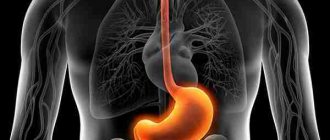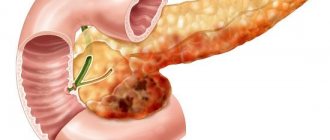The occurrence of stomach pain during a prolonged absence of food in the body indicates that there are problems in your gastrointestinal tract. You should not endure pain in any form – even if it is short-term and weak. You need to understand that the body signals with pain that there is a problem and it needs to be eliminated.
Expert opinion
Tsareva Nadezhda
General practitioner, hepatologist, site expert
You shouldn’t experiment with health on your own, taking medications on the advice of friends. Only a professional gastroenterologist can help you get rid of the disease and stomach pain.
Expert opinion
Svetlana Arkhipova
Gastroenterologist, site expert
Previously, we provided a complete list of painkillers for the stomach, we recommend that you familiarize yourself with it here.
Causes of pain on an empty stomach
Hunger pain in the stomach can occur for various reasons. The main ones are:
- Disruption of the gastrointestinal tract - to varying degrees;
- Hormonal imbalances;
- Stress and increased fatigue;
- Alcohol and smoking abuse;
- Excessive use of medications;
- Poor nutrition;
- Injuries;
- Sedentary lifestyle and metabolic disorders;
- Chronic diseases of other organs and systems.
Pain on an empty stomach indicates that negative processes are occurring in it associated with one or more factors:
- Increased release of hydrochloric acid;
- Inflammation of the mucous membranes of the stomach or pancreas;
- Infection with bacteria such as Helicobacter;
- Reaction to other diseases, in particular bile ducts.
In order to be treated correctly, it is necessary to establish the true cause of hunger pain. The effect of recovery depends only on this.
Causes
The causes of stomach pain during hunger are inflammations occurring in the gastrointestinal tract, such as gastritis, duodenitis, bulbitis, enteritis, and peptic ulcers. Such pathologies are manifested by painful spasms in the stomach with a return to the left hypochondrium. Provocateurs for the appearance of uncomfortable sensations on an empty stomach are:
- a sharp jump in acidity in the digestive juice against the background of increased secretion of hydrochloric acid;
- exposure of nerves in the ulcerative lesion, which entails an increase in the sensitivity of nerve endings;
- impact on the gastric mucosa of Helicobacter;
- disruption of the production of leptone and melatonin, which is often accompanied by attacks of hunger pain at night;
- changes in hormonal levels, which is typical during pregnancy;
- unhealthy diet and unbalanced diet;
- stress, problems with the nervous system;
- impaired gastric motility;
- smoking and alcohol abuse;
- long-term treatment with medications, incorrect antibiotic treatment regimen;
- poisoning with toxic substances;
- erosive and ulcerative processes at any stage.
If a painful attack occurs on an empty stomach and lasts about 2 hours, a stomach ulcer should be suspected, but if the duration of the syndrome is longer, inflammation in the intestines.
Symptoms and possible complications
The main symptom is pain in the stomach when there is no food in it. Pain can manifest itself in different ways and be:
- Sharp;
- Blunt;
- Burning;
- Sluggish;
- Constant;
- Short-term;
- Periodic.
Based on its character, a preliminary diagnosis is made. After all, with different diseases, the medical history is different, and pain manifests itself in different ways.
With many diseases of the stomach, pain can occur not only in the area where the organ is located, but also radiate to other parts of the body, for example, to the left or right hypochondrium, lower abdomen, lower back.
Advanced types of diseases of the digestive system take much longer to treat, and chronic forms can accompany a person throughout his life. Then he is forced to take medications and follow a strict diet for the rest of his life. To prevent such a scenario for the development of the disease, you need to consult a doctor at the first signals from the body. Then the treatment will be short-term and effective.
Table of the main types of stomach diseases, symptoms and possible complications
| Name of the disease | Symptoms | Possible complications |
| Acute poisoning | Fever, weakness, nausea, diarrhea, increased flatulence, dull pain in the stomach | Dehydration. intoxication of the body |
| Pancreatitis | Bloating, rumbling in the stomach, hiccups, heartburn, diarrhea or constipation, stomach pain, nausea, increased sweating, low blood pressure, shortness of breath, darkened vision | Stomach ulcer, bacterial intoxication, chemical poisoning of the body Vomiting blood and the appearance of blood in the stool, bleeding |
| Gastritis | Nausea, vomiting, diarrhea or diarrhea, dry mouth, chills, hunger pain of varying degrees and nature in the stomach, aching pain after eating, periodic rumbling in the stomach | Peritonitis - spillage of purulent mass into the abdominal cavity Penetration – transfer of inflammation to nearby organs and tissues Tachycardia |
| Stomach ulcer | Severe sharp pain on an empty stomach, vomiting, chills, sudden decrease in blood pressure, weakness, darkening of the eyes and loss of consciousness, fever | Peritonitis - spilling of purulent mass into the abdominal cavity Malignancy - transition of pathology into a malignant process, the occurrence of intestinal cancer |
| Duodenal ulcer | Abdominal pain, nausea, turning into vomiting (after this temporary relief), constipation or diarrhea, belching with a sour taste, increased gas formation and bloating, stool with pieces of undigested food, black stool, stool with mucus or blood, constant anxiety, sleep disturbance, white plaque in the mouth, lower back pain | Peritonitis - spilling of purulent mass into the abdominal cavity Malignancy - transition of pathology into a malignant process, the occurrence of intestinal cancer |
Any disease begins with symptoms such as heartburn, hiccups, and flatulence. It is these primary symptoms that you should pay attention to and immediately consult a doctor. Otherwise, irreversible processes begin that can lead to blood poisoning and even cancer.
Expert opinion
Svetlana Arkhipova
Gastroenterologist, site expert
We previously talked about the causes of nausea in the morning on an empty stomach, we recommend that you read this information here.
Other provoking factors
The danger of hunger pains is that they may indicate the development of conditions and diseases, some of which are not associated with gastrointestinal problems. Among the reasons are:
- Pregnancy - toxicosis of the first trimester can provoke pain in the solar plexus area.
- Salmonellosis is a manifestation of pain in the navel with the simultaneous appearance of diarrhea and vomiting. There is a strong increase in temperature, weakness, pain in the head.
- Myocardial infarction, complicated by the development of the pericardium and atrial fibrillation. The pain will be compressive in the sternum, but the symptoms are similar to gastrointestinal upset.
- Appendicitis.
- Hormonal imbalances.
- Stress and psycho-emotional stress.
Diagnostic methods
At the first examination, the doctor collects an anamnesis of the disease, asks you questions about your health and the time when the first signs appeared. Then he conducts a general examination, including measuring temperature and pressure, and also palpating the abdomen. For example, with an ulcer, any touch of the abdominal region is accompanied by a sharp, dagger-like pain. Abdominal bloating is also a presumptive diagnosis. The doctor can also make a preliminary diagnosis based on abdominal tension. So, with an ulcer, the stomach is very hard, and with pancreatitis, even in the last stages it is more loose and not so tense.
Even a person's behavior can help a doctor determine a diagnosis. So, with peptic ulcers, a person lies motionless, afraid to move, which can increase the pain. And, for example, with pancreatitis, he behaves restlessly, constantly moving and moving around.
But for the diagnosis to be accurate, it is necessary to conduct a series of clinical and laboratory studies in order to identify the causes of pain on an empty stomach:
- Blood test - general, biochemical, water;
- Stool analysis;
- Analysis of gastric juice;
- Biopsy of stomach tissue.
- A set of instrumental clinical diagnostics will also be carried out:
- Ultrasound;
- MRI;
- Gastroscopy – examination using a probe;
- X-ray examination;
- Laparoscopy - two punctures of the abdominal part and insertion of a camera;
- Endoscopy – using an endoscope with a video camera, etc.
Expert opinion
Shoshorin Yuri
General practitioner, site expert
Taking gastric juice is an unpleasant but necessary diagnostic procedure; it determines the acidity in the stomach. An ultrasound will help determine the degree of deformation of the walls of the intestines or stomach. If the stage of the disease is high, then the doctor can take biomaterial from the walls of the stomach to identify cancer cells.
Blood tests will help determine a number of important diagnostic factors:
- Levels of particles in the blood such as amylase, lipases, C-protein;
- Detect diabetes mellitus by insulin and glucose levels;
- The risk of blood clots and blockage of small blood vessels;
- Detect an increase in white blood cells and red blood cells, which indicates infection and inflammation, as well as activation of Helicobacter bacteria.
Gastroscopy helps to see all changes in the condition of the intestines; ultrasound will clearly show whether there are wounds, erosions and ulcers in the organ.
MRI or CT will help in detecting pathological lesions using computed tomography.
To make an accurate diagnosis, doctors carry out differential diagnosis using methods that exclude other diseases and identify the underlying disease and side pathologies, which can manifest themselves in the form of stomach upsets and hunger pains.
Expert opinion
Shoshorin Yuri
General practitioner, site expert
If dangerous complications and a threat to the patient’s life are detected, urgent surgery is performed. If there are no such indications, then diagnostic procedures continue to accurately determine the pathology, its type, type, shape, stage.
Diagnostics
To find out the causes of pain, you will need to consult a doctor.
To find out the reasons for the appearance of hungry pain in the epigastrium, you will need to consult doctors such as:
- psychologist;
- nutritionist;
- gastroenterologist;
- surgeon.
To make an accurate diagnosis, the following methods are used:
- Anamnesis collection.
- Assessment of complaints, specifying the time of occurrence and duration of pain.
- External examination with palpation and percussion of the abdomen.
- Laboratory tests of the patient’s biofluids: general, biochemistry and specific (if necessary, clarification of indicators), for example, gastropanel.
- Study of the quality of gastric juice selected by probing.
- Instrumental examination:
- fibrogastroduodenoscopy – visual assessment of the condition of the gastrointestinal mucosa;
- Ultrasound of the stomach - to compile a general clinical picture;
- MRI is a clarifying method;
- fluoroscopy - to identify ulcers, gastritis, tumors;
- biopsy – selection of tissue from a pathological area of the stomach for histological, cytological and morphological analysis.
Treatment Options for Hunger Pains
After diagnosis, the doctor determines an individual treatment program for each patient, which will depend on the pathogenesis, etiology of the disease, and physiology.
- The classic scheme consists of a complex application:
- Diets;
- Medicines;
- Traditional medicine methods;
- Balancing the psychological state.
If the disease is in the acute phase, then dietary table No. 1 or 1a will be prescribed, including the most gentle diet: vegetable broths, decoctions, liquid porridges. After which table 1b can be assigned, which includes black bread and crackers. Table 5, with positive dynamics of recovery, will include a large number of foods prepared by boiling, stewing, steaming, and baking.
Diet table 5:
Drug therapy may consist of one or more drugs, depending on the severity of the disease. The main traditional regimens include taking medications:
- Ranitidine + denol + erythromycin;
- Omeprazole + erythromycin;
- Omeprazole + amoxicillin + metronidazole + denol + erythromycin.
It is also possible to use traditional medicine methods, including the use of infusions of medicinal herbs, propolis solution, etc.
What processes occur in the stomach at the time of pain?
To understand the causes of hunger pain, we will try to establish what the organ is “busy” with 6–7 hours after eating, and what deviations in activity contribute to the occurrence of stomach pain.
This is the average length of time a bolus of food remains in the stomach.
The organ has elastic folds that allow it to expand and accommodate up to 4 liters of food and liquid. During the specified time, all incoming products must be crushed and turned into a homogeneous mass. The stomach muscles mix the composition to improve the area of contact with the enzymes.
Alcohol, salts, glucose, and excess water are immediately absorbed and pass into the blood. The remainder is exposed to gastric juice containing hydrochloric acid, mucus, enzymes (pepsin, gastrin). It is produced by parietal cells located between epithelial cells. The largest amount is spent on digesting meat and spicy dishes. “Heavy” foods last the longest.
As you know, juice in the stomach can be produced by the sight and smell of food. The enzyme system of the stomach is designed so that it works only in a sufficiently acidic environment. Acidity decreases as it approaches the pyloric sphincter.
The duodenum is part of the small intestine and stands out for its importance. Having received food mass through the pylorus, it continues to break down proteins and carbohydrates. It is here that the secretions of the gallbladder and pancreas are included in digestion, and the action of gastric juice stops.
The synthesis of pancreatic enzymes depends on the secretory activity of the stomach:
- if there is an excess of acid, the synthesis of necessary enzymes that break down proteins is disrupted, this leads to the entry of foreign antigens into the body, causing autoimmune reactions, food allergies;
- low acidity in the stomach - disrupts the production of biochemical substances responsible for the absorption of minerals and vitamins, promotes the loss of iron, zinc, magnesium, calcium, vitamin B12.
Drugs for treatment
Drug treatment is intended not only to relieve symptoms, but also to cure the disease from the inside, that is, to normalize the condition of the mucous membrane of the diseased organ. If the pain is acute and unbearable, pain relief is prescribed, which can include the following medications.
Table of medications for the treatment of hungry stomach pain and their price
| Drug name | Price in rubles |
| Antispasmodic No-shpa | from 50 |
| Bismuth preparation that forms a protective film on the stomach and relieves pain De-nol | from 150 |
| Antacids Almagel, Maalox, Phosphalugel | from 200 |
| Analgesics Ibuprofen, Analgin, Acelizin | from 120 |
| Ganglioblocker and gastroprotective drugs - help reduce the secretory and motor function of the organ Dimecolin, Venter tablets | from 270 |
In addition to relieving pain and spasm, you must:
- Destroy Helicobacter bacteria - this is facilitated by bismuth-based medications;
- Reduce the amount of gastric juice produced - inhibitors, blockers, anticholinergics;
- Prokinetics will help improve motor skills;
- Reduce the damaging effect of hydrochloric acid on mucous membranes - gastroprotectors;
- Relieve inflammation and destroy pathogens - antibiotics.
Expert opinion
Shoshorin Yuri
General practitioner, site expert
The duration of medication use and dosage are determined by the doctor strictly individually. Usually - 2-3 times a day of different dosages (25 mg, 50 mg, 75 mg).
Antibiotic dosage table for various gastric pathologies
| Drug name | Dosage | Price in rubles |
| Oxacillin | 0.5 - 4 times a day | from 200 |
| Clarithromycin | 0.25 - 2 times a day | from 270 |
| Amoxicillin | 0.5 – 4 times a day | from 270 |
| Tetracycline | 0.25 – 4 times a day | from 220 |
Expert opinion
Tsareva Nadezhda
General practitioner, hepatologist, site expert
When prescribing antibiotics, probiotics are also prescribed, which will neutralize the negative effects of the drug on other organs and systems.
Treatment
After identifying the causes of hunger symptoms, the doctor decides what the treatment regimen and diet will be. Often, in addition to medications and diet, traditional recipes are prescribed and the patient’s lifestyle is completely changed.
Medicines
To eliminate the cause and relieve hungry stomach pain, the following are prescribed:
- antibiotics if the provocateur is Helicobacter;
- antispasmodics, if you need to eliminate muscle spasms of the gastric walls;
- for motor impairment – “Metoclopramide”;
- antisecretors, when stabilization of the concentration of hydrochloric acid in the digestive juice is needed - Pantoprazole, Omeprazole;
- painkillers that relieve pain impulses for a long time - analgin;
- specific drugs, the action of which is aimed at eliminating a specific pathology of the stomach;
- hepatoprotectors, which are important for improving the performance and protection of the liver;
- multivitamin complex - to support immunity and eliminate deficiency conditions against the background of food refusal.
Help with hunger pain syndrome: analgin, Pantoprazole, Omeprazole, Cerucal, Lansoprazole. Self-medication with medications is strictly prohibited. Before using each of the listed medications, you need a preliminary diagnosis of a possible problem and consultation with a doctor, since many drugs have contraindications and a large list of negative effects.
Folk remedies
St. John's wort decoction helps relieve hunger pains.
The primary means of alternative medicine that eliminate hunger stomach cramps are:
- a glass of warm water or milk;
- cucumber juice - for regular use, 3 tbsp. l.;
- freshly squeezed juice of plantain leaves;
- St. John's wort decoction;
- dry honeysuckle for decoctions.
The following medicinal plants are no less popular:
- Tea brewed with chamomile. Drink before going to bed (a glass) and during painful spasms (a few sips).
- Ground cinnamon. You need to consume the spice in the morning, on an empty stomach, 1/4 of a small spoon, if you are not allergic. Helps against heartburn as it acts as a neutralizer of hydrochloric acid.
- Peeled cucumbers. Vegetables should be fresh, young, with soft seeds. They should be chewed thoroughly and consumed in any quantity.
- St. John's wort tincture with alcohol. To prepare, add 500 ml of vodka to 2 handfuls of herbs. The infusion sits for 3 days. Drink the medicine - 25 drops in 75 ml of water.
- Decoctions of flaxseeds and oatmeal, which act as enveloping agents and protect the walls of the stomach from acid, thereby preventing the development of pain.










